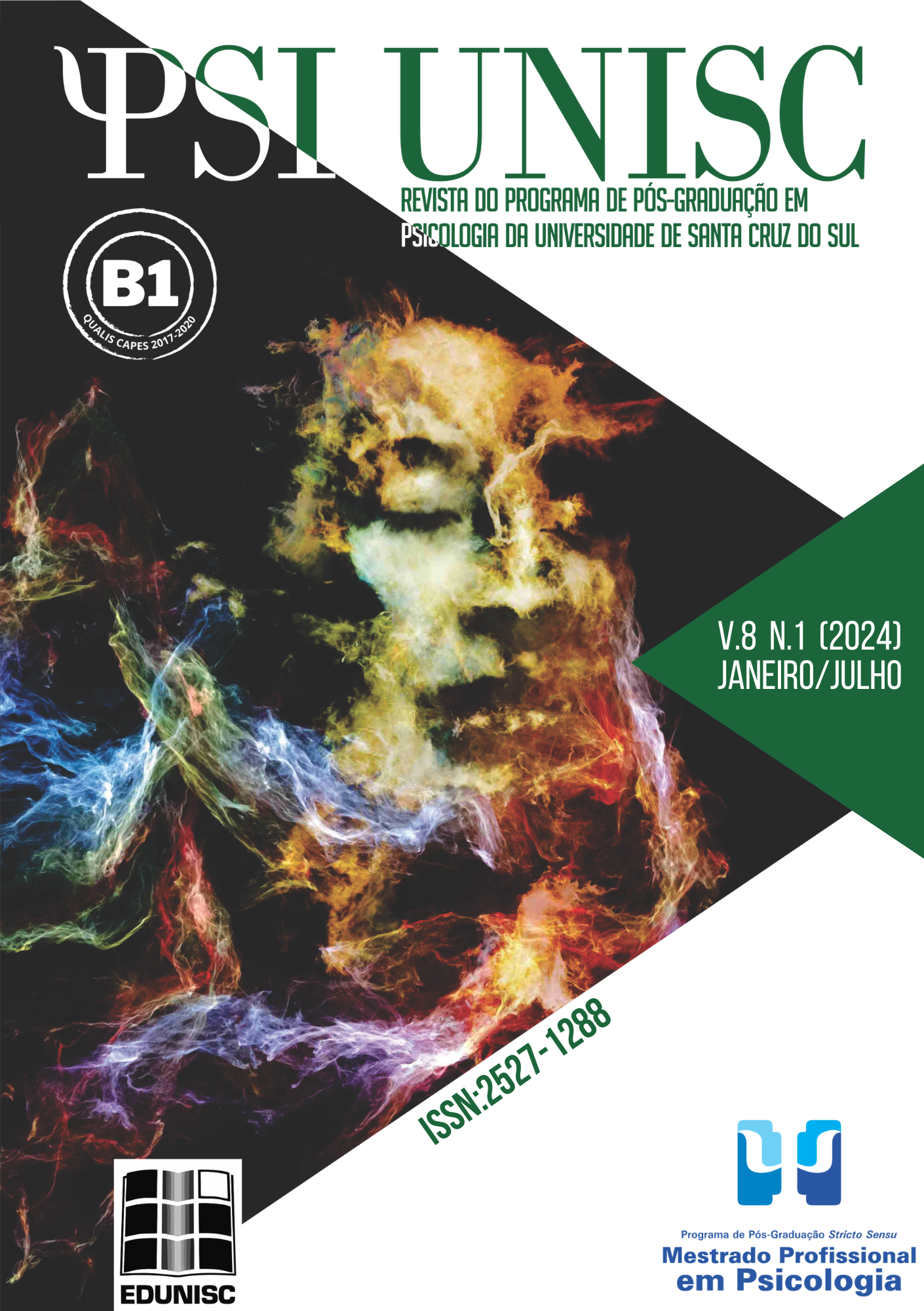Indução de estereótipo e desaprovação na memória de crianças pré-escolares e escolares
DOI:
https://doi.org/10.17058/psiunisc.v8i1.18492Palavras-chave:
Memória, Sugestionabilidade Infantil, Falsas Memórias, Indução de EstereótiposResumo
O presente estudo investigou o impacto da indução de estereótipo e a influência da desaprovação na memória de crianças. Participaram 40 pré-escolares (23 meninas, entre 4 e 6 anos (M= 62,7 meses, DP=8,03) e 36 escolares (17 meninas), entre 7 e 8 anos (M=95,4 meses, DP= 6,21) que receberam a visita de um “cientista” que realizou uma demonstração de ciências. As transmissões do estereótipo e desaprovação foram realizadas através de vídeos. Entrevistas foram realizadas para avaliar a memória das crianças acerca do evento. Os principais resultados indicam que crianças escolares recordaram mais informações acuradas que crianças pré-escolares. Ademais, existe uma relação positiva entre recordação de memórias acuradas e produção de memórias relativas ao estereótipo, que é moderada pela idade dos participantes. A principal contribuição é a investigação empírica do impacto que a faixa etária exerce na acurácia dos relatos de memória, e na relação entre memória acurada e falsas memórias.
Downloads
Referências
Amodio, D. (2014). The neuroscience of prejudice and stereotyping. Nature Reviews Neuroscience, 15(10), 670–682. https://doi.org/10.1038/nrn3800
Blasbalg, U., Hershkowitz, I., Lamb, M. E., Karni-Visel, Y., & Ahern, E. C. (2019). Is interviewer support associated with the reduced reluctance and enhanced informativeness of alleged child abuse victims?. Law and human behavior, 43(2), 156-165. https://doi.org/10.1037/lhb0000303
Bodenhausen, G. (2005). The Role of Stereotypes in Decision-Making Processes. Medical Decision Making, 25(1), 112-118. https://doi.org/10.1177/0272989x04273800
Brainerd, C. J., Reyna, V. F., & Holliday, R. E. (2018). Developmental reversals in false memory: Development is complementary, not compensatory. Developmental psychology, 54(9), 1773-1784. https://doi.org/10.1037/dev0000554
Calado, B., Otgaar, H., & Muris, P. (2018). Are children better witnesses than adolescents? Developmental trends in different false memory paradigms. Journal of Child Custody, 15(4), 330-348. https://doi.org/10.1080/15379418.2019.1568948
Ceci, S., & Bruck, M. (1993). Suggestibility of the child witness: A historical review and synthesis. Psychological Bulletin, 113(3), 403-439. https://doi.org/10.1037/0033-2909.113.3.403
Ceci, S., & Bruck, M. (1995). Jeopardy in the courtroom: A scientific analysis of children’s testimony. American Psychological Association. https://doi.org/10.1037/10180-000
Dickinson, J. J., & Poole, D. A. (2000). Efficient coding of eyewitness narratives: a comparison of syntactic unit and word count procedures. Behavior Research Methods, Instruments, & Computers, 32(4), 537-545. https://doi.org/10.3758/bf03200826
Gagnon, K., & Cyr, M. (2017). Sexual abuse and preschoolers: Forensic details in regard of question types. Child Abuse & Neglect, 67, 109-118. https://doi.org/10.1016/j.chiabu.2017.02.022
Goodman, G. S., Jones, O., & McLeod, C. (2017). Is there consensus about children’s memory and suggestibility?. Journal of Interpersonal Violence, 32(6), 926-939. https://doi.org/10.1177/0886260516657358
Johnson, P. O., & Neyman, J. (1936). Tests of certain linear hypotheses and their applications to some educational problems. Statistical Research Memoirs, 1, 57-93.
Klemfuss, J. Z., & Olaguez, A. P. (2020). Individual differences in children’s suggestibility: An updated review. Journal of child sexual abuse, 29(2), 158-182. https://doi.org/10.1080/10538712.2018.1508108
Knippenberg, A. V., Dijksterhuis, A., & Vermeulen, D. (1999). Judgement and memory of a criminal act: the effects of stereotypes and cognitive load. European Journal of Social Psychology, 29(2-3), 191-201. https://doi.org/10.1002/(sici)1099-0992(199903/05)29:2/3%3C191::aid-ejsp923%3E3.0.co;2-o
Lamb, M. E., Brown, D. A., Hershkowitz, I., Orbach, Y., & Esplin, P. W. (2018). Tell me what happened: Questioning children about abuse. John Wiley & Sons. https://doi.org/10.1002/9781118881248
Leichtman, M. D., & Ceci, S. J. (1995). The effect of stereotypes and suggestions on preschoolers’ reports. Development Psychology, 31(4), 568-578. https://doi.org/10.1037/0012-1649.31.4.568
Matute, H., Blanco, F., & Díaz-Lago, M. (2019). Learning mechanisms underlying accurate and biased contingency judgments. Journal of Experimental Psychology: Animal Learning and Cognition, 45(4), 373-389. https://doi.org/10.1037/xan0000222
Mueller, D. H., Compo, N. S., Molina, J., Byron, A., & Pimentel, P. S. (2015). Productive and counterproductive interviewing techniques: Do law enforcement investigators know the difference? Psychology, Public Policy, and Law, 21(3), 295-308. https://doi.org/10.1037/law0000047
Paz‐Alonso, P. M., & Goodman, G. S. (2016). Developmental differences across middle childhood in memory and suggestibility for negative and positive events. Behavioral Sciences & the Law, 34(1), 30-54. https://doi.org/10.1002/bsl.2239
Piaget, J. (1965). The moral judgment of the child. Free Press.
Poole, D. A., & Lamb, M. E. (1998). Investigative interviews of children: A guide for helping professionals. American Psychological Association. https://doi.org/10.1037/10301-000
Reyna, V. F., & Brainerd, C. J. (1995). Fuzzy-trace theory: An interim synthesis. Learning and Individual Differences, 7(1), 1-75. https://doi.org/10.1016/1041-6080(95)90031-4
Rottman, J., Young, L., & Kelemen, D. (2017). The impact of testimony on children’s moralization of novel actions. Emotion, 17(5), 811-827. https://doi.org/10.1037/emo0000276
Schechory, M., Nachson, I., & Glicksohn, J. (2010). Effect of stereotypes and suggestions on memory. International Journal of Offender Therapy and Comparative Criminology, 54(1), 113-130. https://doi.org/10.1177/0306624x08322217
Schein, C., & Gray, K. (2018). The theory of dyadic morality: Reinventing moral judgment by redefining harm. Personality and Social Psychology Review, 22(1), 32-70. https://doi.org/10.1177/1088868317698288
Schneider, W., & Bjorklund, D. F. (1998). Memory. In W. Damon, D. Kuhn, & R. S. Siegler (Eds.), Handbook of child psychology: Cognition, perception, and language (pp. 467-522). Wiley.
Schwartz, B. L. (2020). Memory: Foundations and applications. SAGE Publications, Incorporated. https://doi.org/10.4135/9781526421036842523
Stangor, C., & McMillan, D. (1992). Memory for Expectancy-Congruent and Expectancy-Incongruent Information: A Review of the Social and Social Developmental Literatures. Psychological Bulletin, 111(1), 42-61. https://doi.org/10.1037/0033-2909.111.1.42
Stein, L. M., & Pergher, G. K. (2001). Criando falsas memórias em adultos por meio de palavras associadas. Psicologia: reflexão e crítica, 14(2), 353-366. https://doi.org/10.1590/s0102-79722001000200010
Zollo, L. (2020). The consumers’ emotional dog learns to persuade its rational tail: Toward a social intuitionist framework of ethical consumption. Journal of Business Ethics, 168(2), 295-313. https://doi.org/10.1007/s10551-019-04420-4
Downloads
Publicado
Como Citar
Edição
Seção
Licença
A submissão de originais para este periódico implica na transferência, pelos autores, dos direitos de publicação impressa e digital. Os direitos autorais para os artigos publicados são do autor, com direitos do periódico sobre a primeira publicação. Os autores somente poderão utilizar os mesmos resultados em outras publicações indicando claramente este periódico como o meio da publicação original. Em virtude de sermos um periódico de acesso aberto, permite-se o uso gratuito dos artigos em aplicações educacionais e científicas desde que citada a fonte conforme a licença CC-BY da Creative Commons.




